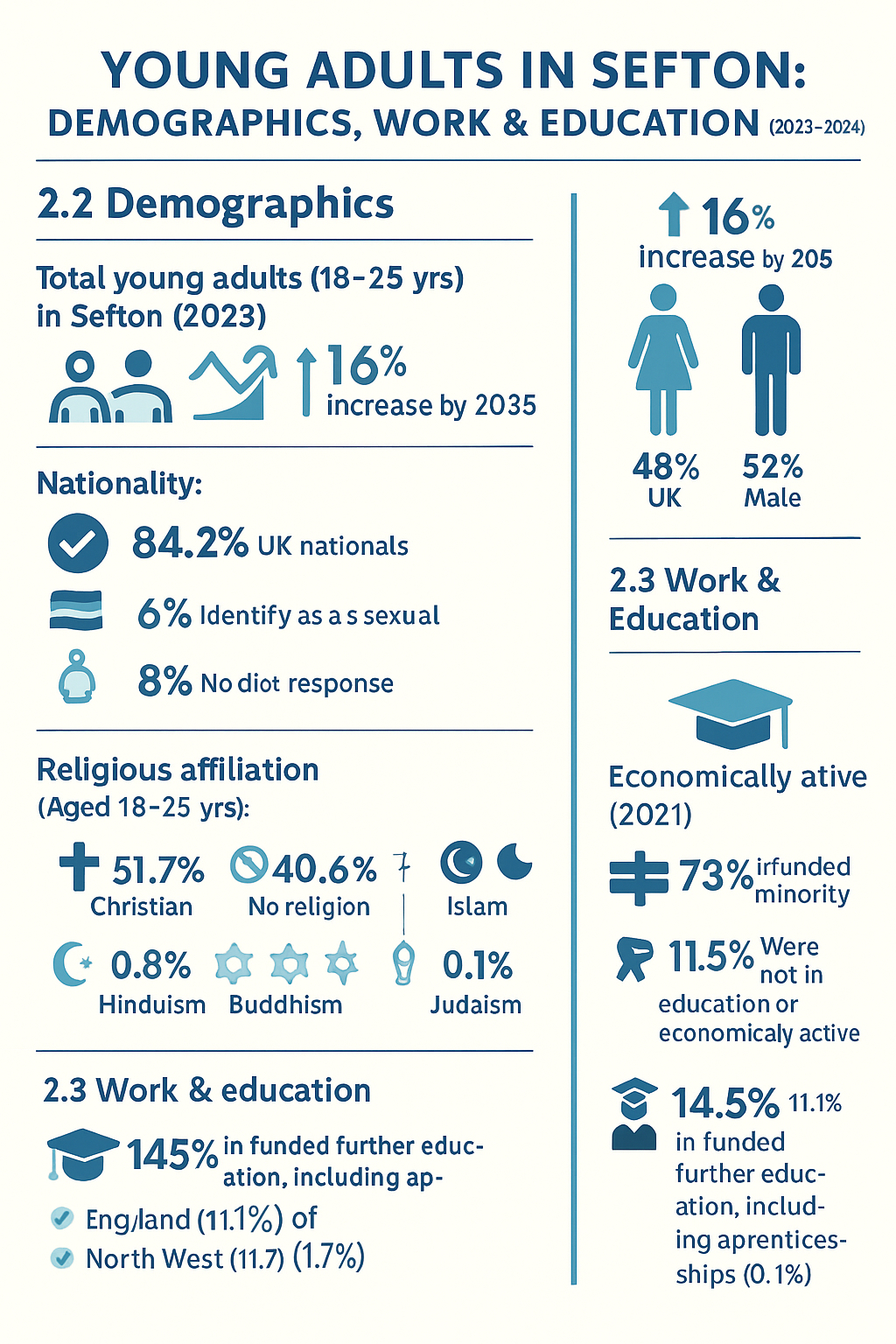Wellbeing in Young Adults in Sefton
The current cohort of young adults aged 18 to 25 year in Sefton have lived through a challenging and ever-changing time during their formative adolescent years. This includes growing up with austerity, the coronavirus (COVID-19) pandemic, the subsequent cost-of-living crisis, and the rising prominence of social media. In addition, in Sefton young adults have had the additional stress of coming to terms with the tragic events in Southport last summer.
Large reductions in public spending were introduced in the UK throughout the 2010s to help reduce the deficit to pay for the 2007/2008 financial crisis. This lead to increases in food insecurity, homelessness, insecure employment, negative impacts on mental health, and reduced access and quality of essential services(27). These are all variables well understood to impact on the potential for someone to achieve their potential and experience positive wellbeing throughout their lives.
Current young adults experienced the COVID-19 pandemic at a pivotal time in their lives when they were finishing their education and potentially entering the job market, as well as gaining their wider independence. The COVID-19 pandemic and associated restrictions had a large impact on young people at the time, and the longer-term impacts of this are yet to be fully understood. Research has shown that the COVID-19 pandemic and associated restrictions had negative effects on young people's mental health(28-31). During the pandemic, many young people felt that their needs were not treated with the same priority as adults(29). This could have exacerbated their mental distress as they did not feel they were treated fairly. There is limited research on the long-term effects of the COVID-19 pandemic on the well-being of young people.
Over the last few years, there has been a cost-of-living crisis in the UK due to multiple different factors, including Global events, the COVID-19 pandemic and Brexit(32). This has had multiple negative impacts on health in the UK, particularly for those more disadvantaged. The cost-of-living crisis has particularly affected young people as they are more likely to work in low-paid, insecure work. This has affected young people's ability to have a healthy standard of living. Between January 2022 and January 2023, the number of young people in England experiencing food insecurity doubled(33).
The attacks in Southport and subsequent riots have affected the whole community of Southport, including young adults. These events have also created reverberations around the whole of the borough.
Demographics
Figure 1 shows: In Sefton in 2023, there were 20,856 young adults aged between 18 and 25 years(34). This represents 7.3% of the total population of Sefton. Forty-eight percent were female and 52% male. The number of young people in this age group in Sefton is projected to increase by 16% by 2035.
In Sefton, 94.2% of young adults aged 18 to 25 years identified as being from the United Kingdom, 5.1% from other nationalities, and 0.7% as having both United Kingdom and another nationality(35).
According to the 2021 census, 86% of young people aged 16 to 24 years in Sefton identify as straight or heterosexual(35). Six percent identify as a sexual minority group, and 8% did not answer questions about sexual orientation. The majority of young adults aged 18 to 25 years in Sefton identified as Christian (51.7%), followed by those with no religion (40.6%)(35). There are a smaller number of people with other religions such as Islam (0.8%), Hinduism (0.5%), Buddhism (0.2%), Sikhism (0.1%) and Judaism (0.1%).

Work and education
In 2021, 73% of 18 to 25-year-olds in Sefton were economically active, meaning they were employed, self-employed, waiting to start a job that had been offered, or were actively looking for work(35). However, 11.5% were not in education or economically active.
In 2023/24, 14.5% of people aged 19 to 24 years old in Sefton were in funded further education, including apprenticeships(36). This is above the England (11.1%) and North West (11.7%) averages. Five percent of young people aged 19 to 24 years in Sefton were in education and training funded by advanced learner loans, such as college courses. This was also above the England and North West averages.
In 2021, 7% of young adults aged 18 to 25 years in Sefton provided unpaid care work(35). The majority of whom provide more than 20 hours of unpaid care work a week. [RM1]
General health and wellbeing
Twenty percent of people aged 18 to 25 years in Sefton have a long-term physical or mental health condition(35). This affects day to day activities in three-quarters of young adults with long-term conditions in Sefton.
SHOUT survey
In 2024, Sefton Council undertook the SHOUT survey to help understand more about children and young people's experiences living in Sefton. This survey includes 1075 responses from young people aged 17-25 years(37). Please note those who completed this survey who were 17 are 18 at the time of writing this report.

Figure 2: Do you feel actively involved in decisions about your life? Source: SHOUT survey
Figure 2 shows that half of the young people aged 17 to 25 years in the SHOUT survey felt they were able to take part in decisions about their lives(37). Almost a third felt that their ideas were acted on. However, only 11% felt listened to, and 8% felt that they were ignored in decisions involving their own lives.

Figure 3: Is there anywhere you feel unsafe? Source: SHOUT survey
Figure 3 shows the places where young people in Sefton aged 17 to 25 years feel unsafe(37). Over half of the young people included in the survey felt safe everywhere. Common places where young people felt unsafe included public transport, local parks and on the way to school/college.

Figure 4: What do you do in your spare time? Source: SHOUT survey
Figure 4 shows the activities which young people aged 17 to 25 years in Sefton do in their spare time(37). More than half of young adults reported listening to music, being with friends, using social media and gaming in their spare time. Other common activities young people included doing sports/going to the gym, eating out/going to the pub, reading, going to the cinema, and going to concerts and other events.

Figure 5: What do you do often? Source: SHOUT survey
Figure 5 shows healthy activities which young people aged 17 to 25 years in Sefton in the SHOUT survey often do(37). 32.4% of young people report eating a balanced diet, 40.5% sleeping well, and 39.7% exercising regularly.

Figure 6: Which of the following impacts your mental health/emotional wellbeing? Source: SHOUT survey
Figure 6 shows what young people aged 17 to 25 years in the SHOUT survey feel impacts their mental health and emotional wellbeing(37). More than half felt that tests and exams impacted their mental health and emotional well-being. Over a third reported that body image, cost of living, family problems and loneliness impact their mental health and emotional wellbeing.
Care leavers
In 2023/2024, 96% of care leavers aged 19 to 21 years were living in suitable accommodation in Sefton. This is above both the England (88%) and Northwest (91%) averages(36). However, only 48% were in education, employment or training, which is below the England (54%) and North West (53%) averages.
Key points
- Young adults in Sefton aged 18 to 25 years have lived through challenging times in their formative adolescent years and early adulthood, including austerity policies, the COVID-19 pandemic, and the cost-of-living crisis. This may have impacted their mental health and emotional wellbeing.
- People aged 18 to 25 years make up 7.3% of the Sefton population. The number of people in this age group is projected to rise by 16% in the next ten years.
- 73% of young people in Sefton aged 18 to 25 years are economically active. 11.5% are not economically active or in education.
- Twenty percent of people aged 18 to 25 years in Sefton have a long-term mental or physical health condition.
- More than half of young people aged 17 to 25 years in Sefton feel safe everywhere.
- Over half of young people aged 17 to 25 years in Sefton report listening to music, being with friends, using social media and gaming in their spare time.
- More than a third of people in Sefton aged 17 to 25 years report eating a balanced diet, exercising and sleeping well regularly.
- Common things which impact young people aged 17 to 25 years' mental health and emotional wellbeing in Sefton include tests and exams, body image, cost of living, family problems and loneliness.
The following chapter aims to take what we know about the importance of keeping well in ourselves and the experiences of our local young people by hearing directly from them on what keeps them well. This was done through a collaboration between the young people themselves and a local photographer skilled in participatory research.

